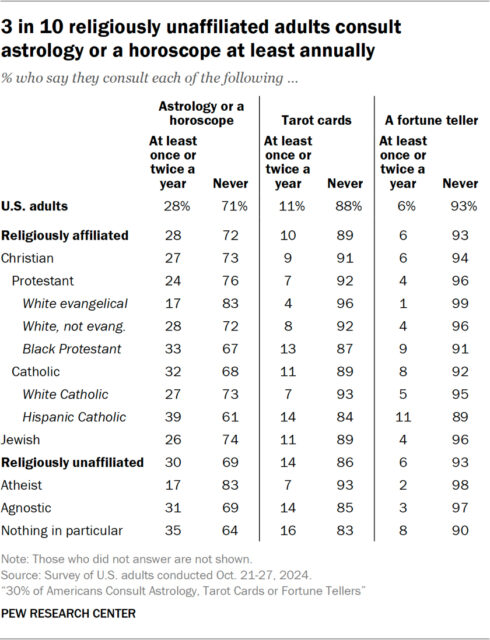(RNS) — With tarot cards showing up on Barnes and Noble shelves, in viral TikToks and in cutesy Jane Austin-themed sets, perhaps it’s no surprise that 30% of U.S. adults consult a fortune teller, tarot cards or astrology on a yearly basis.
That’s according to a Pew Research Center study released Wednesday (May 21), which introduced new questions gauging how Americans engage in these practices. Researchers found that American adults today are now as likely to attend religious services on a monthly basis as they are to annually consult astrology, fortune tellers or tarot.
“In recent years, we’ve heard a lot about growing interest in new age practices, especially among young people and on social media, and this data shows that these practices are fairly widespread across American society,” Chip Rotolo, a research associate on Pew Research Center’s Religion and Public Life team and the report’s lead author, told RNS.
They’re especially prevalent among certain groups. Younger adults under 30 are more likely to engage in these practices than older age groups, the study found, and women are about twice as likely as men to believe in astrology. The religion breakdowns show that Hispanic Catholics, Black Protestants and those who describe their religion as “nothing in particular” are the most likely to believe in astrology and to consult it at least annually. They are also the mostly likely groups to say consulting tarot cards, astrology or fortune tellers gives them valuable insights, while atheists and white evangelical protestants are least likely to believe in or consult astrology. (Rotolo noted that the findings related to the “nothing in particular” religious group are likely attributable to other factors, like gender or age.)
But it’s LGBTQ+ Americans who appear the most invested in these practices. A notable 54% consult a horoscope or astrology at least once a year, and 33% say they consult tarot cards on a yearly basis. They are much more likely than non-LGBTQ+ adults to believe in astrology and to say these practices provide helpful insights and inform major life decisions.
“These practices sometimes emphasize things like fluidity and openness and non-rigid boundaries. And there’s work showing that people connect their identity to this,” explained Rotolo. He added that research shows many LGBTQ+ Americans struggle to feel welcome in certain religious communities. “I would say it’s not particularly surprising that these other new age practices are ways that they are connecting to spirituality,” he said.

“3 in 10 religiously unaffiliated adults consult astrology or a horoscope at least annually” (Graphic courtesy Pew Research Center)
While these findings indicate how far-reaching these practices have become, there isn’t evidence of a major shift in Americans’ beliefs in astrology. Roughly the same percent as in 2017 of U.S. adults — 27% — claim today to believe the position of the stars and planets can affect people’s lives. “When we look among different religious and demographic groups, there is almost no change in belief in astrology over the past eight years,” Rotolo noted.
And while nearly 1 in 3 Americans consult tarot cards, astrology or fortune tellers on a yearly basis, most do so for enjoyment, rather than spiritual guidance; 20% of U.S. adults say they opt in to one or more of these practices “just for fun,” and the other 10% do so for “helpful insights.” Only 1% of U.S. adults say they heavily rely on these practices when making significant life choices.







